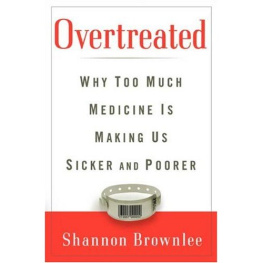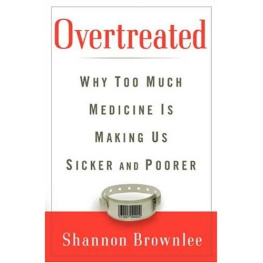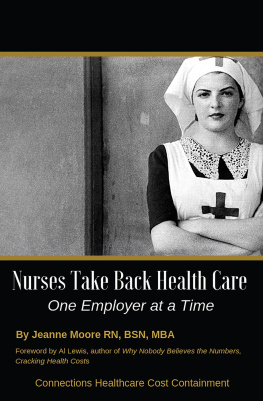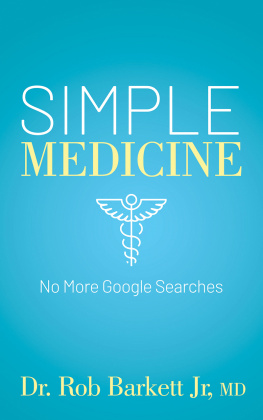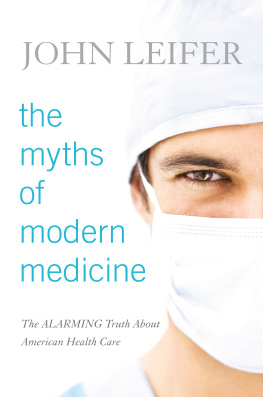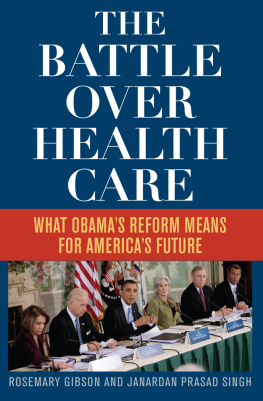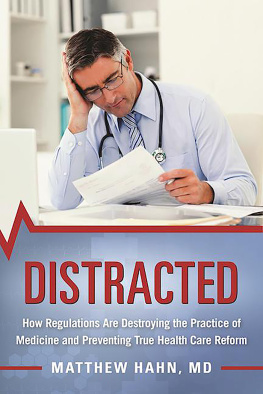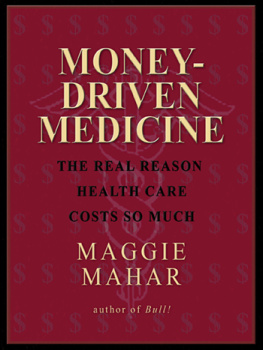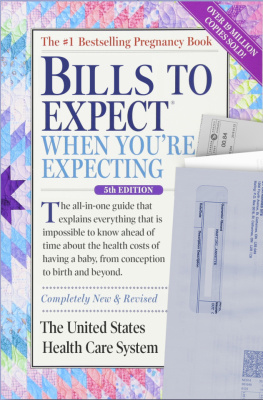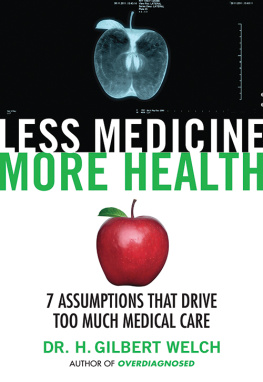Overtreated
Why Too Much Medicine Is Making Us Sicker and Poorer
Shannon Brownlee
Bloomsbury USA
www.bloomsburyusa.com
Praise for Overtreated
Its very good. Read the book. Kevin Drum, Political Animal, Washington Monthly.com
Her argument is compelling [a] worthwhile and thought-provoking volume. Boston Globe
Alarming and intriguing. Bloomberg.com
My choice for the economics book of the year Its the best description I have yet read of a huge economic problem that we know how to solve but is so often misunderstood. David Leonhardt, New York Times
Overtreated is a necessary, if bitter tonic. As the election season starts to take shape, we desperately need an unbiased examination of the mess were in and some substantive ideas for fixing it. Overtreated delivers on both counts Brownlee uncovers some truly amazing facts [and] has given us a thoughtful push in the right direction. Cleveland Plain Dealer
[An] excellent new book. Slate.com
Contrary to Americas common belief that in health care more is more that more spending, drugs and technology means better care this lucid report posits that less is actually better Her incisiveness and proposed solution can add to the health care debate heated up by the release of Michael Moores Sicko. Publishers Weekly (starred review)
With the skill of a crack prosecuting attorney Brownlee sheds light on events, attitudes, and legislation in the twentieth centurys latter half that led to this economic nightmare. Booklist (starred review)
[Brownlee] presents a stunning but reasoned picture of the out-of-control, inefficient and often tragically ineffective U.S. health care system This rousing call for change, accessible for general readers, is recommended. Library Journal
Brilliantly sets out the problems with U.S. health care. BMJ
A compelling and damning indictment of the way health care is organized and delivered in the richest country in the world. If Michael Moores recent film Sicko exposed viewers to the excruciating dilemmas faced by people who cant access American medicine, Overtreated provides the flip side, with compelling stories of people who are injured or die because they get too much of a good thing. Canadian Medical Association Journal
Finally, someone willing to expose the dirty little secret of U.S. health care. If you have insurance you will certainly get too much health care, and in this situation more is definitely not better. Shannon Brownlees book, Overtreated, will open your eyes to the problems and point the way to the answers. Susan Love, M.D., president and medical director of Dr. Susan Love Research Foundation and author of Dr. Susan Loves Breast Book
In the blizzard of books on our health care system, Shannon Brownlees is unique in its provocative argument that individuals and the nation suffer from misguided and costly treatments. Patients, physicians, and policy makers would do well to consider her evidence as an important prescription for reform. Jerome Groopman, M.D., Harvard Medical School and author of How Doctors Think
This book could save your life. In gripping detail, Shannon Brownlee explains how well-insured Americans get much more high-tech medical care CT scans, angiograms, and the like than they need, enriching the hospitals and doctors who provide it, but driving up the overall costs of health care and often endangering patients lives. Brownlee clearly shows in this important book that overtreatment, like undertreatment, is very bad medicine. Marcia Angell, senior lecturer in social medicine at Harvard Medical School and former editor in chief of the New England Journal of Medicine
Overtreated will scare you. And thats a good thing. In this vivid and arresting tour of medicine in America, Shannon Brownlee shows why the care that is supposed to make us healthier frequently makes us sicker instead. At a time when health care reform is atop the political agenda again, this book should be required reading not only for every lawmaker and medical professional, but for every voter and patient, too. Jonathan Cohn, author of Sick: The Untold Story of Americas Health Care Crisis and the People Who Pay the Price
With her razor-sharp analyses, Shannon Brownlee disentangles the messy paradoxes of todays health care mess and turns every assumption on its head. She will forever change the way you view health care while restoring your hope for its future. This book is an important read for anyone interested in health care reform, which, in this day and age of overtreatment, should be all of us. Pauline Chen, author of Final Exam: A Surgeons Reflections on Mortality
Overtreated should be read by anyone interested in health care economics. Tyler Cowen, marginalrevolution.com
Marvelous. thehealthcareblog.com
For my parents:
Joan Carroll
Mick Brownlee
Phyllis Brownlee
Contents
died in a hospital in Washington, D.C., from a brain infection that began as a rotten tooth. His single mother had been trying for weeks to find a dentist willing to take Medicaid payments to care for her two sons. Then the family lost its Medicaid coverage and Deamonte died, because his mother couldnt afford to pay for an $80 extraction. His brain infection cost the District of Columbia $250,000. The Institute of Medicine recently estimated that about eighteen thousand Americans die prematurely each year, simply because they lack health insurance.
Its not as if we havent tried to fix the system several times, in fact, over the past century, first in World War I, then again during the Great Depression and the Truman and Eisenhower administrations. Attempt number five was in the 1960s, when Medicare passed despite vehement opposition from the American Medical Association. Doctors viewed Medicare as the first step on the path toward socialized medicine, which they feared would lead to a loss of income. The most recent effort to reform health care came during the Clinton administration, and foundered in part because of Harry and Louise, characters who appeared in television ads paid for by the insurance industry. The ads scared Americans into thinking that covering the uninsured would mean the rest of us would lose some of our coverage, in order to pay for all those new bodies coming into the system. Most of us feel sorry for the uninsured, but we want no part of a plan that involves rationing.
with an unfair, dysfunctional, and spectacularly expensive system. In 2006, we spent an estimated $2.1 trillion on health care. Thats almost as much as the worldwide market for petroleum, and more than the United States spends on food. We spend more per capita on health care than the Chinese spend, per capita, on everything. Looking to the future, the Centers for Medicare and Medicaid Services predicts annual health care costs will hit $4.1 trillion by 2016, eating up nearly 20 percent of our gross domestic product. We currently spend nearly $6,000 apiece on health care, two and a half times the median for the rest of the industrialized world.
What do we get for our money? Politicians are constantly telling us we have the best health care in the world, but thats simply not the case. By every conceivable measure, the health of Americans lags behind the health of citizens in other developed countries, starting with life expectancy. In 2001, U.S. life expectancy at birth was seventy-seven years, which put us a few months ahead of Cyprus, Costa Rica, and Chile but years behind Canada, Japan, and Western Europe. We rank twenty-eighth in the world on infant mortality rates, behind Cuba, the Czech Republic, and the United Kingdom, countries that ought to be beating us at soccer, not health. We are no less disabled by disease than citizens of most developed nations, and our medical care is, with few exceptions, no better at helping us survive specific diseases. A recent study of heart attack patients found that Canadians did just as well as American patients though many Americans consider Canadian health care, which provides fewer expensive, invasive procedures, to be an inferior system.
Next page
